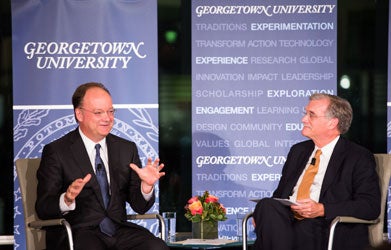Title: Georgetown Launches New Initiative to Design Future of Higher Education
The public good that universities provide is in danger of falling victim to social and technological change, Georgetown President John J. DeGioia said during the launch of a university initiative to explore innovative ways to deliver valued education into the future.
NOVEMBER 21, 2013THE PUBLIC GOOD THATuniversities provide is in danger of falling victim to social and technological change, Georgetown President John J. DeGioia said during the launch of a university initiative to explore innovative ways to deliver valued education into the future.
“We need to emerge as strong advocates for higher education as a public good,” he said to an audience of students, faculty and staff. “… We have to realize that education is more than dumping skills in students’ laps and laptops. The knowledge that we are committed to discovering and sharing comes about when students, scholars and the broader public are mutually engaged in their different but reinforcing ways.”
Georgetown launched “Designing The Future(s) of the University” as an integrative initiative to engage the university community in an exploration of issues facinghigher education and to actively experiment with new ways to deliver Georgetown’s signature education.
JUNCTURE POINT

Georgetown President John J. DeGioia answers a question posed by Georgetown Provost Robert Groves during a discussion at the “Designing the Future(s) of the University” launch event.
The Wednesday evening event began a speaker series tied to the initiative that will feature a diverse set of thought leaders to provide their perspectives and engage the university community through dialogue and design workshops to look at innovation in teaching and learning and the next steps.
Georgetown Provost Robert Groves introduced DeGioia and later moderated a discussion and Q & A session.
“We here at Georgetown believe that the decisions we as faculty, students and staff make over the next two or three years will determine what Georgetown is going to look like 20 to 30 years from now,” said Groves during his introductory remarks. “We think we’re at one of those juncture points.”
CONVERSATIONS AND COLLABORATIONS
The initiative allows Georgetown to be proactive toward potential disruptions of higher education by treating the question of the future of the sector as a design challenge, DeGioia said.
The initiative also integrates conversations and collaborations that have already begun to make higher education more accessible, foster scholarship at the frontiers between disciplines and enrich classrooms.
The university is meeting the challenges facing higher education by experimenting with online classrooms and software, including MOOCs, through its partnership with edX and investing in an Initiative on Technology-Enhanced Learning (ITEL) to enrich teaching on campus through technology.
FORMATION, SCHOLARSHIP AND OUR PUBLIC ROLE
We have lost the sense of education as a public good. The challenges faced here are impossible for us to ignore. The damage being done to our public institutions and our colleagues within them is incalculable.”
—John J. DeGioia, Georgetown President
DeGioia provided a framework that examines the purpose of universities and how the institutions may sustain their values in an uncertain future where federal and state funding to colleges and universities is decreasing.
As foundations and for-profit companies increase their influence and spending, higher education faces an identity crisis and a rocky future, he said.
“We have lost the sense of education as a public good,” he said. “The challenges faced here are impossible for us to ignore. The damage being done to our public institutions and our colleagues within them is incalculable.”
He said three “interlocking and mutually reinforcing” elements provide the work of the university: the personal formation of students, scholarship and research of faculty and a commitment to playing a public role in society.
“The three in tandem—formation, scholarship and this public’s role — comprise the university and cannot be split up,” explained DeGioia. “Indeed the notion that these roles can be separated is what lies behind so many efforts to make ‘education more efficient.’”
“CAMPUS-WIDE CONVERSATION”
DeGioia said future sessions in coming months will detail some concrete projects already underway to tackle challenges such as affordability, increased globalization, declining federal research support and evolving technologies.
”These reflections are offered as we begin a campus-wide conversation on how we can respond to the challenges and threats that characterize this moment for higher education,” DeGioia said.